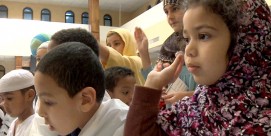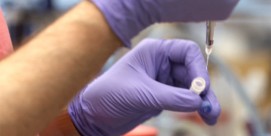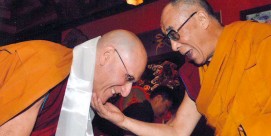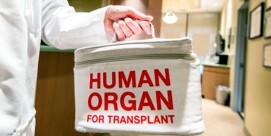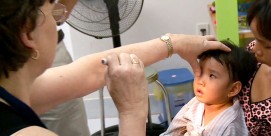In This Episode << SLIDE LEFT TO SEE ADDITIONAL SEGMENTS
Pediatric AIDS Corps
FRED DE SAM LAZARO: In Malawi, one out of every four children dies before reaching the age of five. Famine is chronic, and AIDS has left tens of thousands of orphans, often in the care of struggling grandparents, like Robin Nangwandu. Many children, like his grandson Mcanthony, are HIV positive.
ROBIN NANAGWANDU (through translator): I will continue working until I die. I don’t have enough food stocks, just enough money to buy day to day. It’s not easy to care for a kid who is HIV positive; not easy to shuttle him back and forth to hospital.
DE SAM LAZARO: Until recently, there were just two pediatricians to care for the entire public health system. Dr. Peter Kazembe was one.
(to Dr. Kazembe): How many children in this country, approximately, are HIV positive?
Dr. PETER KAZEMBE: Well, it’s estimated at 83,000 children now.
DE SAM LAZARO: Eighty-three thousand children, and to serve all of them you have two pediatricians?
Dr. KAZEMBE: Two pediatricians, yes.

Getting a checkup |
DE SAM LAZARO: Malawi has just one medical school, and Kazembe says most of its graduates leave for more prosperous countries, like neighboring Botswana, Britain, or the United States.
Dr. KAZEMBE: The issues are the same in all the countries in southern Africa, certainly. You know, salaries — poor salaries, poor working conditions. There’s nothing more frustrating than knowing what you need to do but not having the resources to do it.
DE SAM LAZARO: Dr. Kazembe is in charge of one effort to bring health care resources to Malawi. Its center is a modern, American-style clinic, complete with 11 American doctors. They are typically in their first job after residency and will spend at least one year rotating through this busy clinic and also in some Malawian public health facilities. The Pediatric AIDS Corps program is the brainchild of a physician at Baylor College of Medicine in Houston.

Dr. Peter Kazembe |
Dr. MARK KLINE (Baylor College of Medicine): You know, obviously a number of long-term solutions have to be put in place to encourage African doctors to remain in Africa and to bring back African doctors who have immigrated to the developed world. But while those fixes are being put in place, we can’t afford to lose a generation of children to this epidemic.
DE SAM LAZARO: With a grant from the drug giant Bristol Myers Squibb, Kline designed a program that pays the doctors a stipend of $40,000 a year. It’s a fraction of what they could earn at home, but the program also pays down up to $40,000 in student loan debt for each year of service.
Dr. KLINE: Half of the doctors that we have in the program could not have participated were it not for the student loan debt repayment provision, because they simply couldn’t afford to do so.
DE SAM LAZARO: Three years after it began, about 60 physicians have been placed in 11 African countries. Their mission is to treat patients, but more importantly to train local providers on the front lines, like nurses and clinical officers. In addition to training, Baylor’s own clinic offers model conditions not found in Malawi’s crowded public health care system, such as working equipment, hygienic facilities, and drugs. That was enough to bring Dr. Portia Kamthunzi home from the U.K, despite a big pay cut.

Dr. Omalara Thomas |
Dr. PORTIA KAMTHUNZI: It’s not just the money for me, it is the job satisfaction as well. Working with HIV positive children I feel like I can relate to them better than other people that are coming from other countries, because in a way I know the culture. I know the type of background they are coming from.
DE SAM LAZARO: It may be a modern clinic for Malawi, and it does offer the once prohibitive anti-retroviral or ARV drugs for AIDS. But for the visitors this is a culture of severe limits compared to the “do-whatever-it-takes” American system they trained in.
Dr. CHRIS BUCK: I have one patient I can think of in particular that’s a 17-year-old boy. He’s pretty severely immune suppressed. He’s been on ARVs for a long time, and he has a gastric tumor, and it’s just kind of slowly killing him, unfortunately, and I can think of so many things that I could do for him in the States to improve his prognosis, from diagnostic tests to different medicines, and here I’m really hampered and limited. I really find that to be distressing.
Dr. OMALARA THOMAS: I think every day you wonder and you say to yourself when you’re prescribing these medicines, but what difference really is this going to make? You know, really what they need is food.
Dr. SAEED AHMED: I worked at a very high-acuity-care hospital in New York at Columbia, and if one patient died or two patients died in a week or a month, it would be a big deal. Then we come here and during our time on the wards we might have three or four patients die a day. And coming to terms with that and coming to terms with there being limits to what we can do for kids was shocking and hard.

Dr. Fitzhugh Mullan |
DE SAM LAZARO: One prominent advocate says programs like Baylor’s are a payback to poor countries who have long helped fill the doctor and nurse shortages in rich nations.
Dr. FITZHUGH MULLAN (Project Hope): The Baylor AIDS Corps is a spectacular example of nongovernmental commitment to a contribution to certain poor countries in a specific area — pediatric AIDS — that really is part and ought to be part of a larger contribution that we as a country make back to countries that have been generous to us in spite of the economic inequalities between us.
DE SAM LAZARO: Dr. Mullan has long advocated a much larger federal program like Baylor’s. It’s right, not just morally he says, but strategically.
Dr. MULLAN: There are battles for hearts and minds going on in Africa. China is very present. And sending doctors abroad, sending nurses abroad, is partly a statement of what we are beyond Coca-Cola and other commercial enterprises.
DE SAM LAZARO: There’s no shortage of doctors who want to go. For every one chosen, Baylor has to turn away two.
Dr. KLINE: I think most of them do it because they feel that AIDS in Africa is the challenge of this generation. This is a very highly idealistic group of young physicians, by and large, and they want to do something very meaningful. Straight out of their training they want to have an immediate impact.

Dr. Amy Sims |
DE SAM LAZARO: The doctors say their Africa stint has been profoundly formative, and likely not their last. New Yorker Omalara Thomas is bringing it full circle in her family. Her parents are Nigerian immigrants to America.
Dr. THOMAS: I’ve been involved with trying to develop, hopefully, a program with Nigerian, I guess you can say, expatriates to the U.S. and physicians there who at some point do want to come back to Nigeria and do want to work.
Dr. AMY SIMS: I’m actually going back for specialist training in a couple months in the States, and specialists are something that are kind of few and far between here in Africa, and so I plan to use that to train African health workers and kind of pass on that knowledge, and so I always see myself coming back to Africa.
DE SAM LAZARO: Amid all the poverty and suffering, they say, are great rewards, like sharing good news with young Mcanthony’s grandfather.
Dr. BUCK: He looks fantastic! You’re doing a really great job taking care of him.
DE SAM LAZARO: Or watching the teen club on the clinic grounds, knowing that without this clinic few of these young patients would still be alive.
For RELIGION & ETHICS NEWSWEEKLY, this is Fred De Sam Lazaro in Lilongwe, Malawi.

